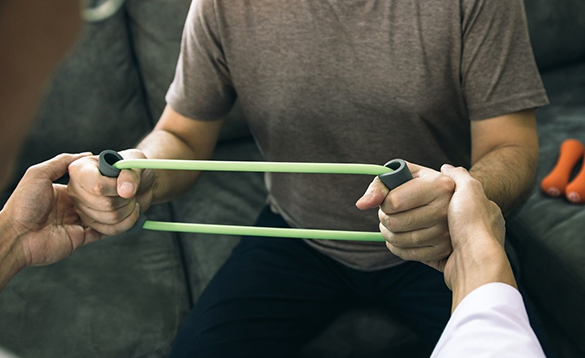
The brain, spine and nerves are the body’s main communication network, controlling all our decisions, emotions and actions – from eating with chopsticks, to walking and preparing a meal. When disease or injury cause this network to break down, the results can be devastating.
For stroke and injuries to the brain and spine, the resulting disability and loss of independence happens in an instant and can last for years.
“It is heart-shattering to see how stroke can rob a person of their mental and physical capabilities. Many stroke survivors have to grapple with long-term effects such as weakness, numbness, and speech disturbances. Some may have cognitive deficits affecting short-term memory, decision-making and judgement abilities. They may also face physical issues such as difficulty with balancing and coordinating movements,” says A/Prof Au Wing Lok, Medical Director, National Neuroscience Institute (NNI).
The key to patients regaining independence, reducing their need for support, and improving their quality of life – rehabilitation. A/Prof Peter Lim, Senior Consultant and former Head, Department of Rehabilitation Medicine, Singapore General Hospital (SGH) explains, “Specialised care with focused therapy, appropriate assistive devices and mobility equipment can make all the difference. Such care helps avoid or manage associated complications, reduce impairments such as paralysis, restore mobility and self-care abilities. A well-rehabbed stroke survivor should be able to return home to loved ones instead of having to be transferred to a nursing home. Research studies show that stroke rehabilitation leads to lower death rates, improved outcomes, shorter hospital stays and higher rates of home discharge.”
Around 75% of strokes occur in persons aged 65 years and older, which is why Singapore’s ageing population is the primary reason for stroke cases rising from 5,760 in 2009 to 8,326 in 2018*. By 2030, one in four people in Singapore will be over 65 years old. To soften the impact of the silver tsunami, the Department of Rehabilitation Medicine at SGH and NNI are planning a Centre for Neuroscience Rehabilitation. The Centre will provide post-acute recovery care to patients with neurological conditions such as stroke, brain tumours, spinal cord and brain injury upon their discharge from acute hospitals within a well-equipped, research-focused environment. A dedicated multidisciplinary team of academic healthcare professionals specialising in rehabilitation and neuroscience will care for these patients.
The Centre aims to conduct research on post-acute recovery care for patients with neurological conditions to improve patient care and treatment methods. This includes trials on new medications and innovative technology for rehabilitation, such as robotics. The Centre will also emphasise education and training of caregivers and healthcare professionals.
If you would like to partner NNI and SGH in advancing rehabilitative care delivery for patients with neurological conditions, please contact Ms Clarisse Lim at Clarisse_Lim@nni.com.sg or Ms Angela Chen at Angela_ML_Chen@nni.com.sg.













 Get it on Google Play
Get it on Google Play